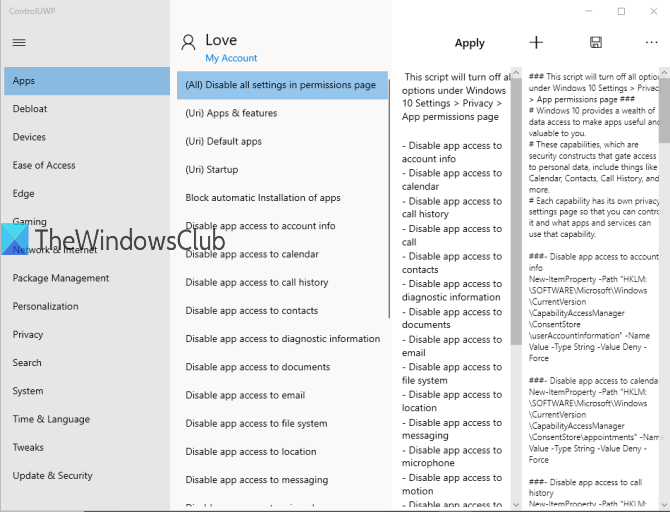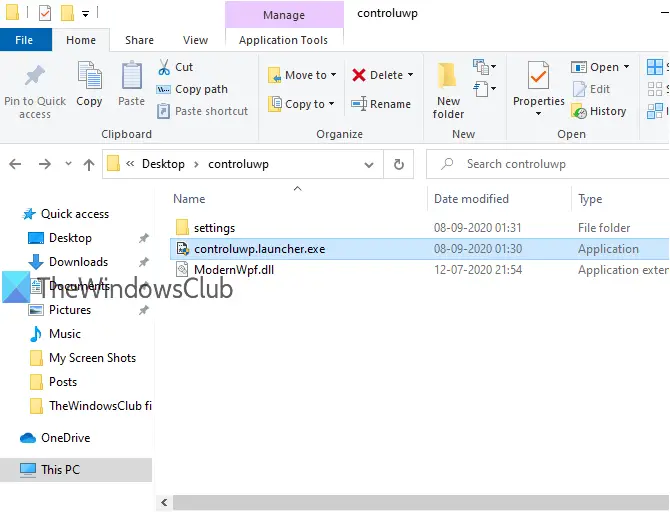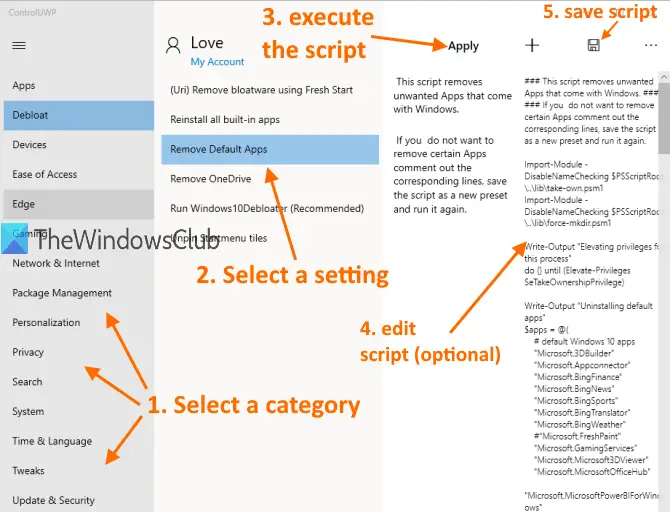This post will show you how to manage Windows 10 settings using a freeware called ‘ControlUWP’. Though Windows 10 already comes with a native Settings app to access and manage options related to network, desktop background, apps, Windows 10 user accounts, and lots more, this freeware helps to remove bloatware and disable a lot of privacy and app-related options that are not possible using the built-in Settings app.

Apart from that, it lets you access or open important options of the Settings app quickly. You can access the different categories present on its interface and then open a particular settings page in the Settings app with one click. For example, it can help you open the Mouse page, Taskbar page, Privacy page, etc., by accessing the associated categories.
It also has a powerful feature that lets you disable all settings on the permission page with just one click. You can trigger the command and it will disable app access to Calendar, call history, location, microphone, etc., in a single shot. Apart from that, it can also help you disable telemetry, reinstall built-in apps, and more.
The image above shows its main interface with all the categories and the Apply button to make the changes. For disabling different settings in Windows 10, we need to use Registry Editor. But this software does those Registry changes automatically by running pre-added PowerShell scripts. You can also make changes to those scripts or add more scripts.
Note: There is no option to reset or undo the changes done by this software for most of the settings. Therefore, you must use it carefully. Otherwise, you have to undo or perform the changes manually by accessing Registry keys and values. To overcome unexpected changes, it is good to have a system restore point before using this or any other third-party tools.
Control Windows 10 Settings with ControlUWP
Grab the zip file of this open-source software and extract that file. In the extracted folder, you will see the settings folder that contains PowerShell scripts related to different options and controluwp.launcher.exe file. Execute that file and its interface will open.

The software interface is easy to understand. There are mainly three columns that cover everything. The left section includes all the categories. Selecting a category will show different settings in the middle column.
Once you select a setting, its Registry path and script information (what the script does) is visible on the right column. You can also edit the selected script in this section and save the changes using the Save button. The right column also contains the Apply button to run the script and made the changes. If you want to add a new script, then it can also be done using + button.

So, you first need to access the left section. Some of the categories like Devices, Ease of Access, Gaming, Time & Language, Personalization, System, and Network & Internet are only available to open pages in the Settings app of Windows 10, while other categories help you disable different types of settings. Here are the important categories:
- Apps: This category helps to disable the automatic installation of third-party apps, block app access to call history, microphone, pictures, webcam, videos, calendar, documents, email, etc.
- Debloat: By accessing this category, you can run scripts to remove pre-installed apps by using Fresh Start (this Fresh Start feature is moved though), remove default apps, remove OneDrive, unpin tiles from the Start menu, re-install built-in apps, and execute Windows10Debloater.
- Edge: In this category, you can disable SmartScreen Filter, AutoFill for credit cards, synchronization of data, and prevent Microsoft Edge from running in the background. Though the settings are useful, these don’t work on Chromium-based Microsoft Edge perhaps. If you are using legacy Microsoft Edge, then these settings might work.
- Privacy: This is an important category. In this category, you can access and use settings such as disable telemetry, WiFi Sense, Windows Tips, clipboard history, customer experience improvement program, etc. You can disable all privacy settings at once or one by one. Thankfully, this category also provides an undo option that helps to enable all privacy settings again.
- Search: It includes the scripts to disable Bing in Windows search, uninstall Cortana, and open the Permissions & history page.
- Update & Security: Here you can find a few important scripts like disable password reveal button in the login screen, Windows Error Reporting, disable forced Windows Updates, etc.
Just browse categories and execute a script of your choice.
This software is a good option to manage or control Windows 10 settings. You can download this freeware from Github.
It can also be helpful in many cases as you don’t have to edit the Registry manually. All you have to do is explore categories to find settings and run the scripts when you’re sure enough to add such changes to your Windows 10 PC.